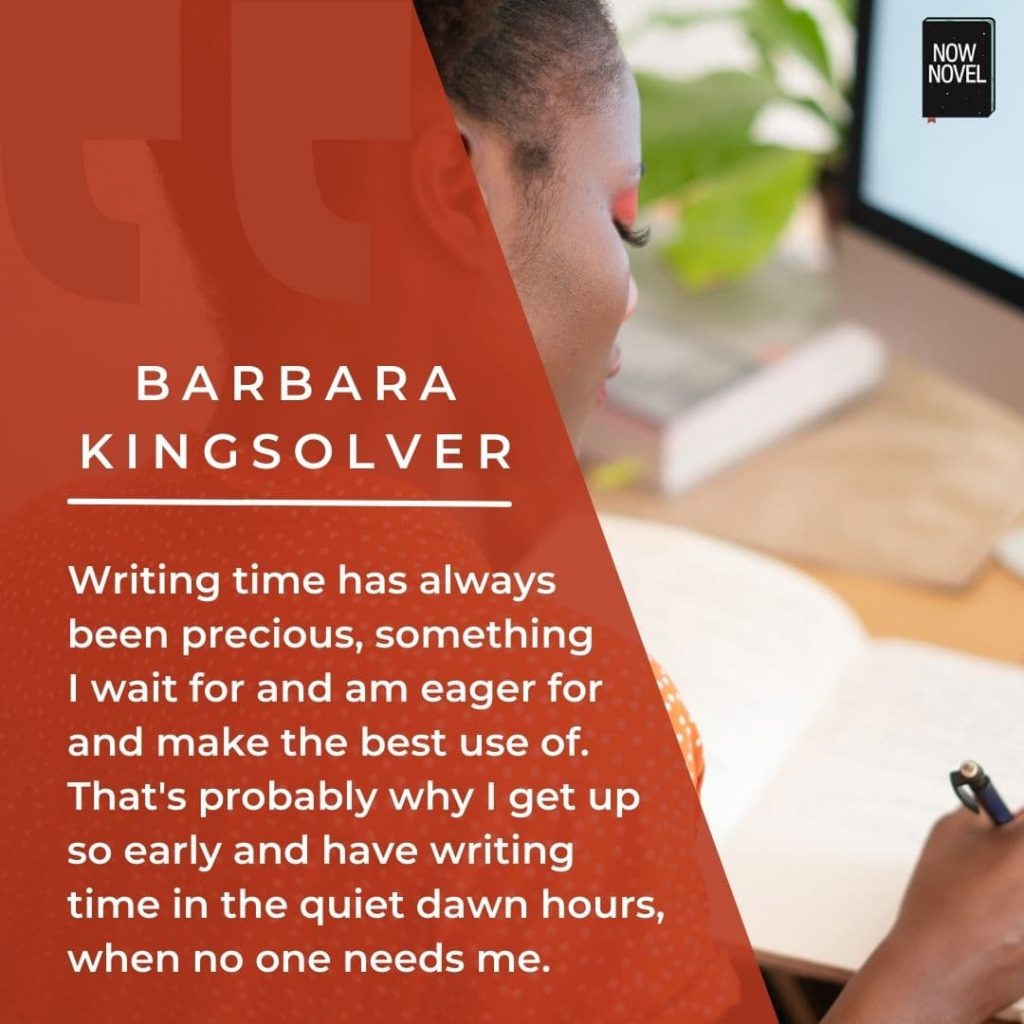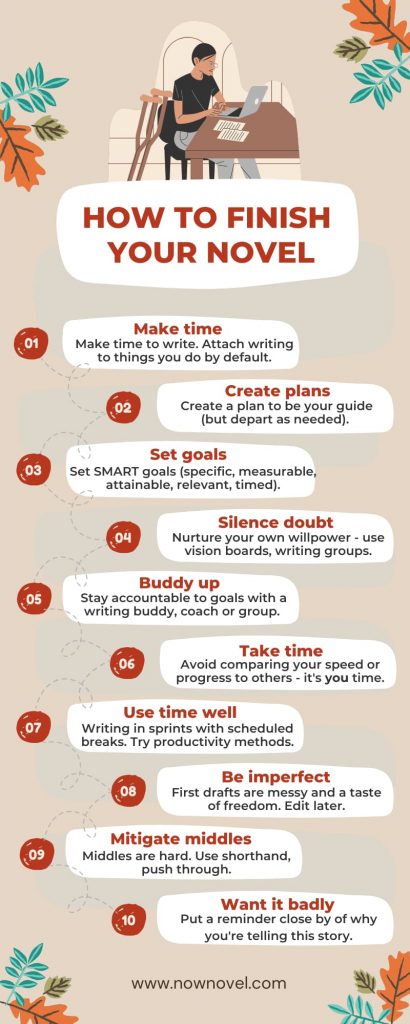Finishing a novel is hard. Get proactive so that this is the year it happens. Whether you’re writing a first novel or your fourth, follow through with these ten tips to reach your writing goals:
To finish your novel this year:
- Make time to write
- Create a story plan
- Write to smart goals
- Have a system to silence doubt
- Get a writing buddy
- Avoid comparing yourself to others
- Use writing time effectively
- Avoid perfectionism – the first draft is for you
- Prepare for the middle slump
- Want to finish your book
A list may seem simple. But there are productivity strategies and tips from authors below to try new methods and make sure you keep going:
1. Make time to write
The first step is making the time to write.
When Now Novel members take a hiatus, ‘time’ is a common reason given.
This is easy to understand and empathize with. So much likely competes for your time, whether it’s a high-pressure corporate job or a demanding start-up, freelancing deadlines or job-hunting. Having young kids or other responsibilities is something many writers have to juggle with their other dreams.
Until you make writing a priority, though, it’s hard to make that mental switch from finding time to making it.
To make time to write so you can finish writing a book, try:
- Speak with family and friends about your writing goals. Supportive members of your circle will understand if you need more me-time to write your story, and may have practical suggestions surrounding focus, productivity and more.
- Adjust your sleep/wake schedule. Toni Morrison spoke of waking up before her family to write in an interview (more on that below) as a necessity.
- Stack the habit of writing with things you do already. For example, before you catch up on your favorite TV show, write for 15 to 20 minutes. We ‘ve discussed BJ Fogg’s concept of habit-stacking and writing motivation before.
If you just don’t have large stretches of time free, there’s still a lot you can accomplish in 15 minutes or (if you’re lucky) a daily, hour-long writing sprint:
- Create a scene summary (use Now Novel’s Scene Builder writing tool to link scene ideas and rearrange them into a document you can download and edit further as you need).
- Create a character profile.
- Brainstorm a story location.
- Create a timeline of your current chapter’s main story events.
2. Create a story plan
Why is it so hard to finish a novel?
Many writers prefer the mystery and discovery of ‘pantsing’ – not having a rigid story outline but seeing where the draft takes you.
One of the challenges of this approach is it’s sometimes easier to become stuck.
A benefit of creating a story plan is writing to an outline gives direction and intent whenever you sit down to write. That structure is something many people find guiding and encouraging.
In looking back on learning how to finish writing a story, many writers share stories of learning to balance creative freedom with putting in place necessary parameters to rein in scope and create narrative focus.
When we chatted to a Now Novel member about how she finished writing a book in under 6 months, she shared how her coach’s suggestion to stick post-its on a whiteboard outlining scene ideas helped.
Besides creating further intent and structure, this simplified planning process helped the author to remember to get up and keep moving, which kept the story’s ideas moving, too.
Find an outlining method that works for you and start making a dent. Once you have a vivid idea of what you’re writing about and you have fleshed it out enough, you can get started on writing in earnest.

Finish your book in 6 months
Join Now Novel’s Group Coaching course for daily writing sprints, coach Q&As,
and a structured curriculum.
3. Write to smart goals
To finish any task, the task itself needs to be a goal you’re committed to.
Yet if desire and commitment were enough, everybody who starts an online course would finish it. People give up on writing goals for may reasons:
- The goal was harder to achieve than initially thought
- More time was required than the deadline a writer gave themselves allowed
- The goal was unrealistic (for example, becoming a best-selling novelist from never having written a book, within two months)
The goals you can reach are SMART – specific, measurable, attainable, realistic, and time-based.
James Clear’s book Atomic Habits talks about implementation intentions. Something as simple as adding a ‘when’ and ‘where’ to your writing plan (when you will write, where and also for how long) makes specific times or environments cues that remind you to get writing and keep doing it.
Now Novel writing coach Romy Sommer shares more about setting smart goals in this preview from our monthly writing webinars:
4. Have a system to silence doubt
Many aspiring authors and other creators lose heart or drive to continue because they are prone to self-doubt.
Place motivating, encouraging quotes and/or objects around your writing space.
Consider a secondary writing project, too. Lining up another project (perhaps even in a different genre) may be helpful. Whenever you need a break, you then have another story to focus on if your other story is making you pull your hair out.
You could also journal as you go. Once you’ve written down what you are unsure about in your current writing project, put this aside and carry on.
Your concerns will be useful when you start revising your work. For now, finish your novel in whatever messy form it needs to take and give yourself full license to be ‘bad’ for now.
A wise English literature thesis advisor once said ‘the best thesis is a done thesis’. The same applies to finishing a draft of your novel that may be for your eyes only, at least for now.
5. Get a writing buddy
There are many things people say writing is. A solitary process. A sedentary one.
Buck these ideas of writing and get up and move while you plan stories. Make it a more communal process if this serves your process. Connect with others in a regular writing or critique circle or writing sprint group.
Members of Now Novel’s Group Coaching program found writing sprints and connecting with coaches in Q&As helpful (some even finishing drafts in under six months).
Words that come up often in feedback on the benefits of writing in community with others are ‘accountability’ and ‘support’ – like many other creative endeavors, writing often does indeed take a village.
6. Avoid comparing yourself to others
All of the above suggestions on how to finish a novel are broad strategies and methods to build focus, accountability, good writing habits.
Why broad strategies? Because writing is a different process for very person. We chatted to an alumnus of Now Novel’s Kickstart your Novel program in the interview linked above, a member who finished her novel within six months.
This speed, however, is rare (and the member’s former experience in writing master’s and PhD theses surely helped, given that these are book-length writing projects in themselves and thus teach one about the stamina needed and how to build it).
The point is this: Avoid comparison. Some authors write fast. Some write three drafts max (and possibly, rarely, fewer). Some write many more.
When we chatted to Booker-longlisted South African author Karen Jennings about her novel An Island, Jennings described writing ten or even twenty (!) drafts.
So to finish writing your book, take the time you need. Setting deadlines helps, but allow yourself flexibility and freedom to take the time (and number of drafts you need) to tell a story that satisfies you, too.
7. Use writing time effectively
There are many traps that lie in wait for the aspiring author hoping to finish writing a book. Avoid traps such as:
- Research rabbit holes – leave a note in the margin to look up further authenticating detail for your story later
- Getting feedback too soon (if easily swayed or unsettled by others’ writing feedback). Many who submit story sections for critique in Now Novel’s writing groups have written all or most of a rough draft already
- Looking for the perfect word, phrase, sentence or paragraph – an editor will help you find the mot juste (while ensuring your writing voice still comes through)
It may help to write a brief statement of purpose or intent each time you sit down to write. Use this simple template for writing with intent. Fill it out at the top of your next scene or chapter (you can erase it later)
Date:
Place:
Purpose of writing session:
Purpose of story segment:
Toni Morrison told The Paris Review about how she would wake early in the morning to write when she had young children, since this was the freest time, when others’ needs could come second to the writing process.
Writing before dawn began as a necessity—I had small children when I first began to write and I needed to use the time before they said, Mama—and that was always around five in the morning.
Toni Morrison, interviewed by Elissa Schappell & Claudia Brodsky Lacour, ‘The Art of Fiction No. 134’, The Paris Review (Fall 1993).
8. Avoid perfectionism – the first draft is for you
As Sir Terry Pratchett said, ‘The first draft is just you telling yourself the story.’ Nobody gets everything right – characterization, description, scene-setting and so forth – in the first draft.
There’s kindness and encouragement in this idea – that the first draft is a story you tell yourself with no critics and no censors.
Allow yourself to write clumsy, ugly sentences when you’re feeling stuck and unable to find the perfect image or flow.
Pushing through will help you to get the basics of the story down. You can go back and put on your perfectionist’s hat when it comes to revising.
9. Prepare for the middle slump
Advice on how to finish your novel would be incomplete without a word of caution on story middles.
The middle of a story is where complications usually mount, but it is also a point in the story arc where authors’ sense of the story’s direction often falters. As Bonnie shared in our author chat linked above:
I had a rough idea of what I wanted to do, and I had a pretty good idea of the ending.
It was more the middle, how was I going to flesh that out and keep it interesting? That was the part that was a challenge.
Bonnie Traymore, ‘Author Interview: Bonnie Traymore on Killer Motives‘, Now Novel.
Prepare yourself for the middle slump.
Consider writing the middle of your novel first (if you have an outline) or simply outline the middle in more detail before you start writing.
If necessary to finish your book, write the middle in shorthand, including salient points to flesh out later.
10. Want to finish your book
What many successful authors have is commitment and drive.
Many of our members who finish writing faster have this determination. They love the storytelling process, the self-discovery and creativity it involves.
Remind yourself daily of how badly you want to start and finish a novel and make it a priority. Cut back on activities that take up time but are non-essential. To repeat, try to switch from finding time to making time.
Finish a draft novel in six months with accountability in daily writing sprints, coach Q&As and writing webinars, while connecting with writers at a similar stage of the writing journey.






5 replies on “How to finish a novel: 10 ways to follow through”
Awesome advice!
Great tips. These would’ve helped neo-scribe me many moons ago. Can’t wait to share.
Thanks for reading the blog and sharing, Elias! We’re glad you enjoyed it. ‘Neo-scribe’ is a good word 🙂
I want badly to finish my novel. I don’t want to finish my book badly. But hey, that’s just me.
Thank you, Heather, ambiguity corrected 🙂 It clearly does take a village.